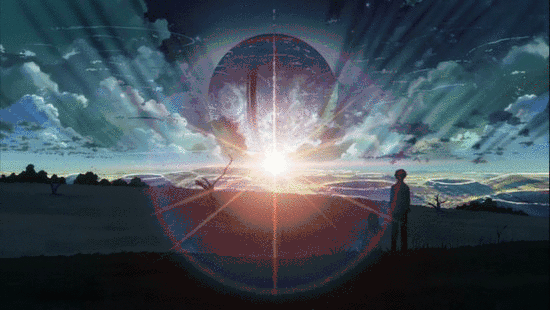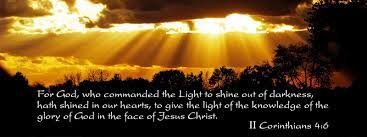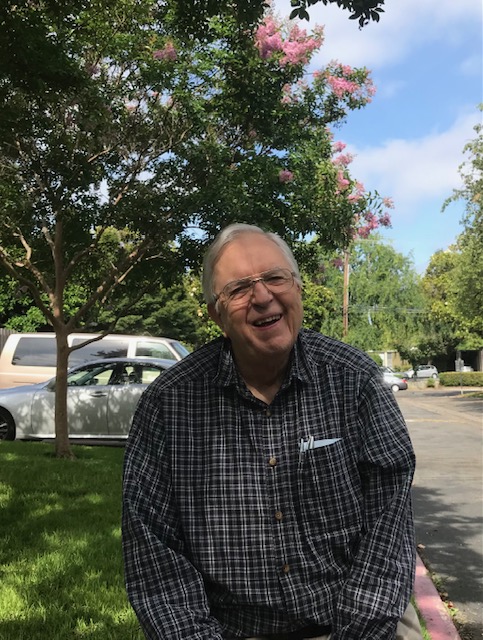
 Then they led Jesus from Caiaphas to the Praetorium, and it was early morning. But they themselves did not go into the Praetorium, lest they should be defiled, but that they might eat the Passover. Pilate then went out to them and said, “What accusation do you bring against this Man?” They answered and said to him, “If He were not an evildoer, we would not have delivered Him up to you.”
Then Pilate said to them, “You take Him and judge Him according to your law.”
Therefore the Jews said to him, “It is not lawful for us to put anyone to death,” that the saying of Jesus might be fulfilled which He spoke, signifying by what death He would die.
Then Pilate entered the Praetorium again, called Jesus, and said to Him, “Are You the King of the Jews?”
Jesus answered him, “Are you speaking for yourself about this, or did others tell you this concerning Me?”
Pilate answered, “Am I a Jew? Your own nation and the chief priests have delivered You to me. What have You done?”
Jesus answered, “My kingdom is not of this world. If My kingdom were of this world, My servants would fight, so that I should not be delivered to the Jews; but now My kingdom is not from here.”
Pilate therefore said to Him, “Are You a king then?”
Jesus answered, “You say rightly that I am a king. For this cause I was born, and for this cause I have come into the world, that I should bear witness to the truth. Everyone who is of the truth hears My voice.”
Pilate said to Him, “What is truth?” And when he had said this, he went out again to the Jews, and said to them, “I find no fault in Him at all. (John 18:28-38)
Then they led Jesus from Caiaphas to the Praetorium, and it was early morning. But they themselves did not go into the Praetorium, lest they should be defiled, but that they might eat the Passover. Pilate then went out to them and said, “What accusation do you bring against this Man?” They answered and said to him, “If He were not an evildoer, we would not have delivered Him up to you.”
Then Pilate said to them, “You take Him and judge Him according to your law.”
Therefore the Jews said to him, “It is not lawful for us to put anyone to death,” that the saying of Jesus might be fulfilled which He spoke, signifying by what death He would die.
Then Pilate entered the Praetorium again, called Jesus, and said to Him, “Are You the King of the Jews?”
Jesus answered him, “Are you speaking for yourself about this, or did others tell you this concerning Me?”
Pilate answered, “Am I a Jew? Your own nation and the chief priests have delivered You to me. What have You done?”
Jesus answered, “My kingdom is not of this world. If My kingdom were of this world, My servants would fight, so that I should not be delivered to the Jews; but now My kingdom is not from here.”
Pilate therefore said to Him, “Are You a king then?”
Jesus answered, “You say rightly that I am a king. For this cause I was born, and for this cause I have come into the world, that I should bear witness to the truth. Everyone who is of the truth hears My voice.”
Pilate said to Him, “What is truth?” And when he had said this, he went out again to the Jews, and said to them, “I find no fault in Him at all. (John 18:28-38)


 Jesus Himself had already said clearly, “I am the way, and the truth, and the life. No one comes to the Father except through me." (John 14:6)
Jesus Himself had already said clearly, “I am the way, and the truth, and the life. No one comes to the Father except through me." (John 14:6)
Seven times, Jesus alluded to Himself as identified with the "great I AM"-- the God who met Moses at the burning bush. (Exodus 3)
God also spoke to Moses and said to him: ‘I am the Lord. I appeared to Abraham, Isaac, and Jacob as God Almighty, but by my name “The Lord” I did not make myself known to them. I also established my covenant with them, to give them the land of Canaan, the land in which they resided as aliens. I have also heard the groaning of the Israelites, whom the Egyptians are holding as slaves, and I have remembered my covenant. Say therefore to the Israelites, “I am the Lord, and I will free you from the burdens of the Egyptians and deliver you from slavery to them. I will redeem you with an outstretched arm and with mighty acts of judgment. I will take you as my people, and I will be your God. You shall know that I am the Lord your God, who has freed you from the burdens of the Egyptians. I will bring you into the land that I swore to give to Abraham, Isaac, and Jacob; I will give it to you for a possession. I am the Lord.” ’ (Exodus 6:2-8)


Jesus, the Son of God is called the Word of God (logos) a masculine noun in Greek. God makes Himself known to us by speaking to us through the prophets, the holy men of old. Their writings comprise our Old Testament. For this reason the entire Bible is called the written Word of God while Jesus retains the title of the living Word. After His resurrection His overwhelmed eleven disciples and a few friends were overwhelmed that He had returned from the dead. Yet in the previous three years together, Jesus told them four times,
In spite of not having gone to Seminary or Bible College, Jesus knew the Old Testament well and recognized that He was there on every page.‘See, we are going up to Jerusalem, and the Son of Man will be handed over to the chief priests and scribes, and they will condemn him to death;then they will hand him over to the Gentiles to be mocked and flogged and crucified; and on the third day he will be raised.’ (Matthew 20:18,19)
While they were talking about this, Jesus himself stood among them and said to them, ‘Peace be with you.’ They were startled and terrified, and thought that they were seeing a ghost. He said to them, ‘Why are you frightened, and why do doubts arise in your hearts? Look at my hands and my feet; see that it is I myself. Touch me and see; for a ghost does not have flesh and bones as you see that I have.’ And when he had said this, he showed them his hands and his feet. While in their joy they were disbelieving and still wondering, he said to them, ‘Have you anything here to eat?’ They gave him a piece of broiled fish, and he took it and ate in their presence.
Then he said to them, ‘These are my words that I spoke to you while I was still with you—that everything written about me in the law of Moses, the prophets, and the psalms must be fulfilled.’ Then he opened their minds to understand the scriptures, and he said to them, ‘Thus it is written, that the Messiah is to suffer and to rise from the dead on the third day, and that repentance and forgiveness of sins is to be proclaimed in his name to all nations, beginning from Jerusalem. You are witnesses of these things. And see, I am sending upon you what my Father promised; so stay here in the city until you have been clothed with power from on high.’
Then he led them out as far as Bethany, and, lifting up his hands, he blessed them. While he was blessing them, he withdrew from them and was carried up into heaven. And they worshiped him, and returned to Jerusalem with great joy; and they were continually in the temple blessing God.' (Luke 24:36-63)
The origin of our Bibles is a wonderful story well worth knowing. Our English Bibles today are quite faithful to the original Hebrew and Greek. Blueletter Bible is one excellent resource for anyone who wants to dive deeper. Suffice it to say that the Old and New Testaments authoritative and binding. God always backs the integrity of His Word.
"All scripture is inspired by God and is useful for teaching, for reproof, for correction, and for training in righteousness, so that everyone who belongs to God may be proficient, equipped for every good work." (2 Timothy 3:16,17)


When God speaks the creation resounds like an antiphonal choir. This is evident in the 19th Psalm, for instance. Our usual daily speech is linear,
"For it is precept upon precept, precept upon precept, line upon line, line upon line, here a little, there a little." (Isaiah 28:10).
Nature does not respond in words by quoting chapter and verse, but by singing as it were. The proper response to God is love which can't be easily verbalized. Words fail lovers. \\
Think of the love songs, books, poems which have been written that are about love.
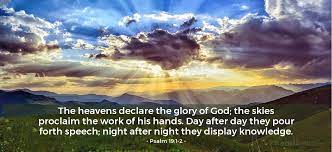
|
Psalm 19God’s Glory in Creation and the LawTo the leader. A Psalm of David. In the heavens he has set a tent for the sun, The law of the Lord is perfect, Moreover by them is your servant warned; Let the words of my mouth and the meditation of my heart |
...Psalm 19 tells us that the knowledge of God has been written for us in two volumes, and that it takes both volumes to know God. There is the revelation in nature, and there is the revelation given in a Book, in the written Word. Both are essential to the knowledge and understanding of God. In the first part of this psalm the Psalmist, David, sets forth the book of nature: Day to day pours forth speech,
and night to night declares knowledge. (Psalms 19:2 RSV) The theory of evolution is an attempt at this, based upon certain types of evidence which have been construed to support it. But what is so desperately wrong is that Darwinism, as it is largely taught in our schools and our popular communications media today, is a means of removing God from his creation. It is a means of teaching that this whole process just happened, apart from any exercise of creative intelligence. Thus the testimony of nature is rendered silent, and the message which God has designed it to speak to man is not heard, and man does not know that there is a God in the universe. That is why man thinks God is dead, if indeed he ever existed at all. Darwinism is one of the major reasons why that idea has seized upon the popular mind in our day.
Something is happening to us as a people because of that. Paul lists them for us. One is that because men do not like to retain God in their knowledge he gives them over to a reprobate mind, i.e., their thinking becomes distorted. This is what is producing the twisted applications of some of the discoveries of science, resulting in some of the tremendously complex, insoluble problems we are facing today. Because men do not want to retain God in their knowledge, because there is this conspiracy of silence to eliminate God from his creation, because there is an unwillingness to acknowledge that God is in the laboratory, as well as in the church building or in the home, God gives men over to a demented science which produces not only helpful technological achievements but also those which blast and ruin us. Science and technology, once regarded as our benefactors, are now appearing to us more and more as our destroyers, having polluted the atmosphere, ravaged the forests, and destroyed many forms of life in various ways. Now they are confronting us with the possibility of the total pollution and destruction of our environment. This is the judgment of God upon a world which twists and distorts the revelation of nature. Nature is designed to tell us not only how things happened but who is behind them. It is perfectly proper for a scientist to investigate the realm of nature. Man has made some wonderful discoveries about how God put things together. They are fascinating, exciting, opening up whole new vistas of life, and properly so. What is wrong is the attempt to exclude God from that realm and not to allow nature to carry us on to that end for which it was designed -- to bring us to an understanding that behind this universe, behind ourselves and the mystery of our own being, is the great intelligence and wisdom and power of a living God. That is why we feel so lost and lonely, alienated and forsaken in a mechanistic universe. The Psalmist takes its characteristics one by one and shows us what they can do. First, "the law of the Lord." That is the widest term for all the written revelation God has given us. "The law of the Lord is perfect." It is complete, there is nothing left out. It is comprehensive, it does everything that we need it to do. There is no part of your life, no problem that you will ever face in your life, no question with which you will ever be troubled, that the Word of God does not speak to and illuminate and meet. So it is perfect, "reviving the soul." Remember that Jesus spoke of "rivers of living water" which would be available to buoy up the human spirit and to meet its need. This is exactly what the Word of God is designed to do for us. Second, "the testimony of the Lord is sure, making wise the simple." Sure means "dependable, reliable." You can count upon this word to be true. Therefore you do not need to know a lot about everything else. The Word of God is not against knowledge; it is only against knowledge which does not begin at the right place. But even if you do not have a lot of knowledge, even if you are "simple" in terms of education you can still be made wise by trusting Scripture because it is sure, it is reliable. That is why we are exhorted:
Then, "the precepts of the Lord are right, rejoicing the heart." Do you not rejoice in your heart to know that you are right about something? When you get into a controversy with somebody and he argues with you but you have the solid assurance that you are right -- what a feeling! Well, that is the way it is with the Word of God. The glorious thing about this Book is that when the story is all told, when everything is said and done it will all end up just as it is written here. This Book is right, it is the way things really are. And, "the commandment of the Lord is pure, enlightening the eyes." The charge is sometimes made that the Bible is a dirty book because it speaks of incest and adultery and fornication and perversions like homosexuality and other ugly things. It also speaks of malice and bitterness and is filled with slaughter and bloodshed. It is often described as an immoral book, and there have been attempts to classify it with some of the immoral and obscene literature which is so widely abroad today. But there is one great difference. It is true that the Bible contains these things, because it is a realistic book which deals with life as it is. But the one great difference is that it never shows evil as though it were good. It never makes adultery look attractive. It always looks like what it really ends up to be -- sordid and shameful. And it never makes homosexuality appear to be inconsequential. It reveals it to be a terrible distortion of human nature, and reveals that those engaged in it are pathetic beings who need to be prayed for and helped and delivered from the clutch of its awful hold over them, which is destroying their manhood or their womanhood. It is pure, enlightening the eyes, showing you the truth. That is what David has found. Also, "the fear of the Lord is clean, enduring for ever." The word "fear" is sometimes read as though it meant cowering in terror before some awful being who is about to strike you dead. But that is not what this means at all. It means respect, honest respect for God. That, says the Psalmist, is clean, and it will keep you clean, too. It is "enduring for ever." Once you enter into the fear of the Lord in its rightful sense you find that this produces a quality of life which keeps you from defiling yourself.
Moreover by them is thy servant warned;
in keeping them there is great reward. (Psalms 19:10b-11 RSV) We do not see ourselves. That is why it is always proper to say, "Lord, cleanse thou me from hidden faults. Help me to see myself through the eyes of a friend who loves me enough to tell me the truth."
And then "Keep me back from presumptuous sins." Presumptuous sins are those in which you are confident that you have what it takes to do what God wants. Self-confidence is presumption. God never asks us to do anything on that basis. If we depend upon ourselves we are acting presumptuously, and any activity which stems from self-confidence is a presumptuous sin. "Whatsoever is not of faith is sin." | Constable's Expository NotesVerses 1-14: David observed in this wisdom hymn that under the influence of the sun, the heavens make God’s handiwork in creation known to humanity. Likewise, people learn of God’s plan to bless humankind under the influence of God’s Law. In view of this dual revelation, in nature and in Scripture, David prayed that God would cleanse his life so he would be acceptable to God. In the polytheistic ancient Near East, this psalm was a strong polemic against the pagan sun gods whom their worshipers credited with executing justice. The psalmist claimed that Israel’s God was the Creator of the heavens, including the sun, and He established justice on the earth. Every day and every night, this revelation of the power and greatness of the Creator communicates, since human beings observe it daily. The presence of the heavenly host is a non-verbal testimony to God’s existence that reaches every part of the planet. Everyone, regardless of his or her language, can understand it (cf. Romans 1:18-20 (NAS), "For the wrath of God is revealed from heaven against all ungodliness and unrighteousness of men who suppress the truth in unrighteousness, because that which is known about God is evident within them; for God made it evident to them. For since the creation of the world His invisible attributes, His eternal power and divine nature, have been clearly seen, being understood through what has been made, so that they are without excuse."). This is "the paradox of wordless speech." It is also an oxymoron. Verses 4-6: God has placed the sun in the heavens. He, not it, is supreme. The figures of the bridegroom and the runner picture the glory and power of this centerpiece of God’s creation. Since it is so glorious, its Creator must be even more glorious. The pagans used the same figures of speech to describe the sun, which they worshiped as sovereign. The name of God used in Psalms 19:1-6 is El, a title that describes the power of God. El is "the strong one." In Psalms 19:7-9 (NAS) "The law of the Lord is perfect, restoring the soul; The testimony of the Lord is sure, making wise the simple. The precepts of the Lord are right, rejoicing the heart; The commandment of the Lord is pure, enlightening the eyes. The fear of the Lord is clean, enduring forever; The judgments of the Lord are true; they are righteous altogether. Psalms 19:7-9; Psalms 19:14 (NAS) "Let the words of my mouth and the meditation of my heart Be acceptable in Your sight, O Lord , my rock and my Redeemer. In 14 the psalmist wrote that El is Yahweh, the name of God that stresses His covenant relationship to Israel. Thus he claimed that the Creator is Israel’s God, not some pagan nature deity. Verse 7: The revealed Word of God has the same dominant influence over humankind as the sun does over nature. Whereas the sun restores natural life, God’s law restores the life of the human soul. The sun dispels physical darkness, but the Word of God removes the darkness of ignorance from our understanding. It is flawless and reliable. Furthermore, it brings joy and wisdom to people because it is correct and enlightening. The terms "testimony" (Psalms 19:7 (NAS) "The law of the Lord is perfect, restoring the soul; The testimony of the Lord is sure, making wise the simple. Psalms 19:7; "statutes, NIV), "precepts," "commandment" ("commands," NIV), and "judgments." Psalms 19:9 (NAS) "The fear of the Lord is clean, enduring forever; The judgments of the Lord are true; they are righteous altogether. Psalms 19:9; "ordinances," NIV) all refer to various parts of the God’s law. [Note: See VanGemeren, pp. 184-87, for explanations of the various words that describe God’s Word that appear primarily in Psalms 19, 119, but also elsewhere in other psalms.] Verse 9 The special revelation of God in Scripture is also free from any mixture of truth and error; it is consistent with reality. Consequently it is enduring and completely righteous. The word "fear" refers to the whole of divine law. Knowledge of God’s law puts the fear (reverential trust) of God in people’s hearts (cf. "Remember the day you stood before the Lord your God at Horeb, when the Lord said to me, ‘Assemble the people to Me, that I may let them hear My words so they may learn to fear Me all the days they live on the earth, and that they may teach their children.' Deuteronomy 4:10 AV). Verses 10-11: David regarded the words of God as more valuable than gold, the most expensive substance in his day, and more pleasing and satisfying than honey, the sweetest substance. God’s words warned him of error and danger, and they brought him rewards of many kinds as he followed them. ...the mark of a true Bible student is a burning heart, not a big head (They said to one another, 'Were not our hearts burning within us while He was speaking to us on the road, while He was explaining the Scriptures to us?' Luke 24:32; "Now concerning things sacrificed to idols, we know that we all have knowledge. Knowledge makes arrogant, but love edifies."" (1 Corinthians 8:1)." Verses 12-13: David’s rhetorical question expresses the impossibility of knowing if or when we violate God’s will without the light that His Word provides. It can bring to light faults hidden otherwise and can warn us of what displeases God so we can confess and avoid these offenses. David asked God to use His Word to bring these sins to his attention so they would not dominate him. This would result in his being blameless in God’s sight and free from the huge mass of sin that would be his without the revelation of Scripture. Verse 14: In closing this psalm, David prayed that his words and thoughts would please God. In view of the context, this takes place as we allow the Word of God to affect our lives. David viewed his words and thoughts as sacrifices to God (cf. "Through Him then, let us continually offer up a sacrifice of praise to God, that is, the fruit of lips that give thanks to His name. (Hebrews 13:15). This is the implication of "acceptable" or "pleasing." As he closed this psalm he evidently regarded God not as his judge but as the foundation of his life and the One who had purchased him for a special purpose. The Word in the hand is fine; the Word in the head is better; but the Word in the heart is what transforms us and matures us in Christ ("Your word I have treasured in my heart, That I may not sin against You. Psalms 119:11 God has revealed Himself in nature and in Scripture. This revelation should move us to bow in humble adoration and willing obedience before our Creator. Psalms 1, 19, 119 all deal significantly with the Word of God. I take this to be the greatest poem in the Psalter and one of the greatest lyrics in the world." Expository Notes of Dr. Thomas Constable. |
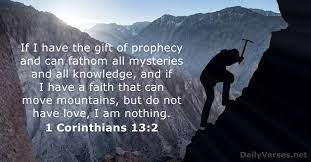 | |
The Gift of LoveIf I speak in the tongues of mortals and of angels, but do not have love, I am a noisy gong or a clanging cymbal. And if I have prophetic powers, and understand all mysteries and all knowledge, and if I have all faith, so as to remove mountains, but do not have love, I am nothing. If I give away all my possessions, and if I hand over my body so that I may boast,but do not have love, I gain nothing. Love is patient; love is kind; love is not envious or boastful or arrogant or rude. It does not insist on its own way; it is not irritable or resentful; it does not rejoice in wrongdoing, but rejoices in the truth. It bears all things, believes all things, hopes all things, endures all things. Love never ends. But as for prophecies, they will come to an end; as for tongues, they will cease; as for knowledge, it will come to an end. For we know only in part, and we prophesy only in part; but when the complete comes, the partial will come to an end. When I was a child, I spoke like a child, I thought like a child, I reasoned like a child; when I became an adult, I put an end to childish ways. For now we see in a mirror, dimly,but then we will see face to face. Now I know only in part; then I will know fully, even as I have been fully known. And now faith, hope, and love abide, these three; and the greatest of these is love. (1 Corinthians 13) |
God is omnipotent and holy. He has sovereign authority over everything in heaven and on earth. He spoke into the void of space and an entire universe sprang into existence without delay. When He speaks to us we ignore Him, take our time to answer, and generally edit His requests. We are guilty of cosmic treason and out to be court marshaled.

For thus says the High and Lofty One Who inhabits eternity, whose name is Holy:
|


 Once "only God" existed. This does not creation was "ex nihilo"--out of nothing. A created universe adds nothing to what God is, was, and will be. God is not one Person but three, and the Three exist eternally outside of time and space in what is called "The Procession of the Trinity." God is a living Being-- far wiser and greater than any man. God does not get lonely, nor bored, nor restless for change. But imagine a day when the Three council together about creating a universe complete with humans made as much like God as possible. There is real risk involved because men having free will and discerning may assume they can be their own gods and be self-sufficient apart from the Creator(s). A broken universe might result.
Once "only God" existed. This does not creation was "ex nihilo"--out of nothing. A created universe adds nothing to what God is, was, and will be. God is not one Person but three, and the Three exist eternally outside of time and space in what is called "The Procession of the Trinity." God is a living Being-- far wiser and greater than any man. God does not get lonely, nor bored, nor restless for change. But imagine a day when the Three council together about creating a universe complete with humans made as much like God as possible. There is real risk involved because men having free will and discerning may assume they can be their own gods and be self-sufficient apart from the Creator(s). A broken universe might result.
Imagine further a division of responsibility in the Divine Committee. (1) The mind of the Father will be devoted to the design, the master plan, as Chief Architect. (2) The Son of God, aka, the Word of God, will translate the blueprints into physical entities. (3) The Holy Spirit will energize, empower and direct the ensemble. The three Persons will stay involved from Day One. When the inevitable rebellion occurs, the Son of God will enter history at a certain point in time and repair what has been broken. men created to be mere puppets with no options as to who they serve will not have free will. Free will within the godhead is highly prized.
Long ago God spoke to our forefathers in many and various ways by the prophets, has in these last days he has spoken to us by a Son, whom he appointed heir of all things, through whom he also created the worlds. He is the reflection of God’s glory and the exact imprint of God’s very being, and he sustains all things by his mighty word of power. When he had made purification for sins, he sat down at the right hand of the Majesty on high, having become as much superior to angels as the name he has inherited is more excellent than theirs." (Hebrews 1:1-4)
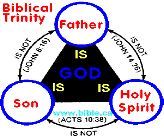 God is not bi-polar, but tri-polar. At least by design, our relationships are not only with one another but mutually with God. The three-fold Corinthians not easily broken.
God is not bi-polar, but tri-polar. At least by design, our relationships are not only with one another but mutually with God. The three-fold Corinthians not easily broken.
“That which we have seen and heard we declare to you, that you also may have fellowship with us; and truly our fellowship is with the Father and with His Son Jesus Christ."
Of course, all relationship derive from the Community of the Trinity—we only have relationships at all because the Godhead is relational among themselves and we are made in His image.
"For this reason I bow my knees to the Father of our Lord Jesus Christ, from whom the whole family in heaven and earth is named…”
(The procession of the Godhead can be seen in two simple illustrations, What is Time? and Who is God? by Ray Stedman)
Man was created in the image of God: Then God said, ‘Let us make man in our image, according to our likeness; and let them have dominion over the fish of the sea, and over the birds of the air, and over the cattle, and over all the wild animals of the earth, and over every creeping thing that creeps upon the earth.’ So God created man in his image,in the image of God he created them; male and female he created them... (Genesis 1:26, 27)
Then the Lord God said, ‘It is not good that the man should be alone; I will make him a helper as his partner.’ ...out of the ground the Lord God had formed every animal of the field and every bird of the air, and brought them to the man to see what he would call them; and whatever the man called each living creature, that was its name. The man gave names to all cattle, and to the birds of the air, and to every animal of the field; but for the man there was not found a helper as his partner. So the Lord God caused a deep sleep to fall upon the man, and he slept; then he took one of his ribs and closed up its place with flesh. And the rib that the Lord God had taken from the man he made into a woman and brought her to the man. Then the man said, ‘This at last is bone of my bones and flesh of my flesh; this one shall be called Woman, for out of Man this one was taken.’ (Genesis 2:18-27)
An original unity of "man" was replaced by a division into two complementary opposites. The image of God in our race is therefore carried by the man and the women in equal weight. Whatever other terms we may wish to associate with man being made in the image and likeness of God, the existence of two separate sexes is a very important part of the image of God which we, as men and women, jointly bear. It is as if half of life is to be understood and interpreted from a man's point of view and half from a woman's point of view. These two points of view are not identical nor opposites, nor polarities, they are complementary!
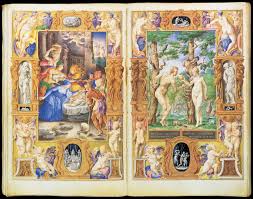 The existence of two sexes and the fact that it takes male and female persons to adequately reflect the nature of God implies that the Being of God is as much masculine as it is feminine. This is a difficult concept because God Himself does not describe Himself as a sexual being. All the persons of the Godhead are called by masculine nouns and pronouns in our English Bibles. Furthermore the godhead consists of a union of Three Persons, not two, as in human marriage.
The existence of two sexes and the fact that it takes male and female persons to adequately reflect the nature of God implies that the Being of God is as much masculine as it is feminine. This is a difficult concept because God Himself does not describe Himself as a sexual being. All the persons of the Godhead are called by masculine nouns and pronouns in our English Bibles. Furthermore the godhead consists of a union of Three Persons, not two, as in human marriage.
Does God speak differently to men compared to women? Yes and no. Both are created spirits, so the term "man" is generic. Men and women are both accountable to God for what they know not for how they feel. Women are far deeper emotionally than men and they differ biologically. But in daily life we don't normally treat women the same way we treat men.

God Always Has Been PersonalFrom Bryce SelfThe Lord definitive of all our relationships because our identity derived from personal relationship with Him first of all… Basis of Christian ‘Koinonia’ as well as separation form the world’s darkness—this relationship excludes that one. Genesis 17:8—Also I give to you and your descendants after you the land in which you are a stranger, all the land of Canaan, as an everlasting possession; and I will be their God.” |



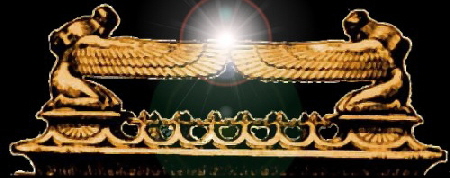
Because God is holy and we are not, a human mediator must bridge the gap. That Mediator is Jesus.
The Tabernacle and the two Temples that followed were built according to exact blueprints given to Moses on Mt. Sinai.
Immediately upon entering the Tabernacle a great wash basin was in the path, and the great altar of sacrifice. Cleansed and consecrated priests descended from Levi could enter the Holy Place where oil lamps were always kept supplied with oil, the bread on the Table of Shewbread could be renewed daily, and incense supplied. A great curtain separated the Holy Place from the Holy of Holies which only the High Priest could enter.
"...The first covenant had regulations for worship and an earthly sanctuary. For a tent was constructed, the first one, in which were the lampstand, the table, and the bread of the Presence; this is called the Holy Place. Behind the second curtain was a tent called the Holy of Holies. In it stood the golden altar of incense and the ark of the covenant overlaid on all sides with gold, in which there were a golden urn holding the manna, and Aaron’s rod that budded, and the tablets of the covenant; above it were the cherubim of glory overshadowing the mercy-seat. Of these things we cannot speak now in detail." (Hebrews 9:1-5)
There are two cherubim over the Mercy Seat, facing each other, beaten from one piece of gold, looking at the blood in the center. “There I will meet with you” above the Mercy Seat and between the cherubim—above || & between == describing the form of the Cross.
"Such preparations having been made, the priests go continually into the first tent to carry out their ritual duties; but only the high priest goes into the second, and he but once a year, and not without taking the blood that he offers for himself and for the sins committed unintentionally by the people. By this the Holy Spirit indicates that the way into the sanctuary has not yet been disclosed as long as the first tent is still standing. This is a symbol of the present time, during which gifts and sacrifices are offered that cannot perfect the conscience of the worshiper, but deal only with food and drink and various baptisms, regulations for the body imposed until the time comes to set things right.
But when Christ came as a high priest of the good things that have come,then through the greater and perfect tent (not made with hands, that is, not of this creation), he entered once for all into the Holy Place, not with the blood of goats and calves, but with his own blood, thus obtaining eternal redemption. For if the blood of goats and bulls, with the sprinkling of the ashes of a heifer, sanctifies those who have been defiled so that their flesh is purified, how much more will the blood of Christ, who through the eternal Spirit offered himself without blemish to God, purify our conscience from dead works to worship the living God!
For this reason he is the mediator of a new covenant, so that those who are called may receive the promised eternal inheritance, because a death has occurred that redeems them from the transgressions under the first covenant. Where a will is involved, the death of the one who made it must be established. For a will takes effect only at death, since it is not in force as long as the one who made it is alive. Hence not even the first covenant was inaugurated without blood. For when every commandment had been told to all the people by Moses in accordance with the law, he took the blood of calves and goats, with water and scarlet wool and hyssop, and sprinkled both the scroll itself and all the people, saying, ‘This is the blood of the covenant that God has ordained for you.’ And in the same way he sprinkled with the blood both the tent and all the vessels used in worship. Indeed, under the law almost everything is purified with blood, and without the shedding of blood there is no forgiveness of sins.
Thus it was necessary for the sketches of the heavenly things to be purified with these rites, but the heavenly things themselves need better sacrifices than these. For Christ did not enter a sanctuary made by human hands, a mere copy of the true one, but he entered into heaven itself, now to appear in the presence of God on our behalf. Nor was it to offer himself again and again, as the high priest enters the Holy Place year after year with blood that is not his own; for then he would have had to suffer again and again since the foundation of the world. But as it is, he has appeared once for all at the end of the age to remove sin by the sacrifice of himself. And just as it is appointed for mortals to die once, and after that the judgment, so Christ, having been offered once to bear the sins of many, will appear a second time, not to deal with sin, but to save those who are eagerly waiting for him." (Hebrews 9:6-28)


But our age has lost the concept that moral absolutes exist (except for death and taxes). In Physics we call this state of affairs "Maximum Entropy!" Chaos, in order words.
"The only meaning in life is existential." "My truth need not be your truth but we ought to seek ways to live together on an overcrowded planet." "Truth statements are suspect because politicians lie and religious leaders are in it for money or power over the people." "My parents mean well, but..." "I know the Bible well but there are obviously many charlatans and false teacher out there, who do I trust?" "For now I'll trust my instincts and someone if the present with good vibes and are consistent." "Karma matters." "Lady Luck is my companion." "I pay attention to someone if they have good vibes". "We don't really want to know one another too deeply, for now it's go with the flow." "There are no absolutes."


Either make the tree good and its fruit good, or else make the tree bad and its fruit bad; for a tree is known by its fruit.
“Brood of vipers! How can you, being evil, speak good things? For out of the abundance of the heart the mouth speaks.
“A good man out of the good treasure of his heart brings forth good things,
and an evil man out of the evil treasure brings forth evil things.
“But I say to you that for every idle word men may speak, they will give account of it in the day of judgment.
“For by your words you will be justified, and by your words you will be condemned.” (Matthew 12:33-37)
Even so the tongue is a little member and boasts great things.
See how great a forest a little fire kindles!
And the tongue is a fire, a world of iniquity.
The tongue is so set among our members that it defiles the whole body, and sets on fire the course of nature; and it is set on fire by hell.
For every kind of beast and bird, of reptile and creature of the sea, is tamed and has been tamed by mankind.
But no man can tame the tongue. It is an unruly evil, full of deadly poison.
With it we bless our God and Father, and with it we curse men, who have been made in the similitude of God.
Out of the same mouth proceed blessing and cursing.
My brethren, these things ought not to be so.
Does a spring send forth fresh water and bitter from the same opening?
Can a fig tree, my brethren, bear olives, or a grapevine bear figs?
Thus no spring yields both salt water and fresh. (James 3:3-12)


Ho, everyone who thirsts,
come to the waters;
and you that have no money,
come, buy and eat!
Come, buy wine and milk
without money and without price.
Why do you spend your money for that which is not bread,
and your listen for that which does not satisfy?
Listen carefully to me, and eat what is good,
and delight yourselves in rich food.
Incline your ear, and come to me;
listen, so that you may live.
I will make with you an everlasting covenant,
my steadfast, sure love for David.
See, I made him a witness to the peoples,
a leader and commander for the peoples.
See, you shall call nations that you do not know,
and nations that do not know you shall run to you,
because of the Lord your God, the Holy One of Israel,
for he has glorified you.
Seek the Lord while he may be found,
call upon him while he is near;
let the wicked forsake their way,
and the unrighteous their thoughts;
let them return to the Lord, that he may have mercy on them,
and to our God, for he will abundantly pardon.
For my thoughts are not your thoughts,
nor are your ways my ways, says the Lord.
For as the heavens are higher than the earth,
so are my ways higher than your ways
and my thoughts than your thoughts.
For as the rain and the snow come down from heaven,
and do not return there until they have watered the earth,
making it bring forth and sprout,
giving seed to the sower and bread to the eater,
so shall my word be that goes out from my mouth;
it shall not return to me empty,
but it shall accomplish that which I purpose,
and succeed in the thing for which I sent it.
For you shall go out in joy,
and be led back in peace;
the mountains and the hills before you
shall burst into song,
and all the trees of the field shall clap their hands.
Instead of the thorn shall come up the cypress;
instead of the brier shall come up the myrtle;
and it shall be to the Lord for a memorial,
for an everlasting sign that shall not be cut off.
